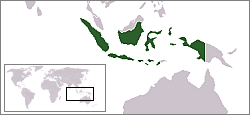Indonesia warns Australia over West Papuan asylum seekers
Friday, February 3, 2006

Indonesia's ambassador to Australia has warned that relations between the two neighbors could be "strained" if the Howard Government grants political asylum to a group of refugees from the troubled Indonesian province of West Papua.
The 43 West Papuans, pro-independence activists and their families, arrived on Cape York, Australia on January 18 after a five-day voyage in an outrigger canoe. They were later taken to an immigration detention facility on Christmas Island, a remote Australian territory in the Indian Ocean.
A spokesman for the group says they fear they will be killed if returned to Indonesian-controlled Papua, where a pro-independence movement has been operating since the 1960s.
Jakarta's ambassador warned of strained relations if they are granted asylum. Indonesia's ambassador, Teuku Mohammad Hamzah Thayeb, said the group had nothing to fear from Indonesian authorities. Asked if granting asylum to the group would strain Australia/Indonesia relations, Thayeb said: "I would hope it will not, but it certainly would have an effect. That's why we have to manage this together and find a solution." President Susilo Bambang Yudhoyono has also guaranteed the group's safety should they return.
Queensland National Senator Barnaby Joyce, who met with the 43 refugees on Christmas Island, said they appear to have a genuine asylum claim and had been persecuted because of their Christian beliefs. "There are documented cases of members within their families being shot," he said. "There's certainly on the record experiences of them being jailed and tortured so I think they would be under risk if they went back," he said.
The group, which includes seven children, arrived carrying a banner accusing Indonesia of terrorism and genocide in the province. Indonesian troops have been repeatedly accused of rights abuses in Papua province, which was taken over by Jakarta in 1963. Over 100,000 Papuans, one-sixth of the population, have died in military operations.

Immigration Minister Amanda Vanstone said, "if they ask for protection we will consider the claim appropriately and if it is appropriate to offer it, we will offer it."
The leader of the asylum seekers, Herman Wainggai, says the Indonesian military treat indigenous Papuans "like animals". Mr Thayeb disagreed: "We have changed fundamentally within ourselves," he said.
Indonesia offered Papua special autonomy in 2001 in an effort to quell unrest from the Melanesian population in the resource-rich area. Mr Wainggai described the Papuan autonomy as a "sham", and said there have been many reports of the Indonesian military "murdering and raping people, and destroying villages since autonomy came into force."
Papua controversially became an Indonesia province after a vote in 1969 overseen by the United Nations called the "Act of Free Choice". The Act of Free Choice was drafted by the UN and gave every adult the right to vote on the issue of independence. However, only 1022 people hand-picked by the Indonesian authorities were allowed to vote. Reinforcing the dubious nature of the poll, the voters gave 100 per cent approval to become part of Indonesia.
Indonesia's ambassador said there was no reason for the West Papuans to seek asylum as they were not criminals.
The Australian Greens said the Indonesian ambassador's assurances that West Papuan asylum seekers would be safe if they returned home should not be believed.
"The new Indonesian Ambassador's assurances about the safety of West Papuan refugees if they are returned to Indonesia are not credible," Senator Nettle said. "The escalating repression of the independence movement and generalised suppression of the people of West Papua is well documented."
"The Australian government should not give in to Indonesian pressure," Senator Nettle said.
Senator Joyce said the group of native West Papuans were Christian, which meant they are ethnically, religiously and politically isolated after an influx of Indonesians to the province.
Related news
[edit]| Wikinews Australia has in-depth coverage of this issue: 43 West Papuans seek asylum |
- "West Papuan refugees may face death if deported" — Wikinews, January 31, 2006
- "West Papuans refugees forced to fly 4000ks despite tuberculosis fears" — Wikinews, January 27, 2006
- "West Papua refugees sent to Australia's Christmas Island Detention Centre" — Wikinews, January 19, 2006
- "40 Asylum seekers missing off Torres Strait" — Wikinews, January 18, 2006
- "Missing asylum seekers found off Cape York" — Wikinews, January 18, 2006
Sources
[edit]- Tom Allard. "Indonesia ups ante on Papuans" — The Age, February 4, 2006
- "Indonesian envoy warns Australia over Papua asylum seekers" — The Jakarta Post, February 3, 2006
- "Indonesian refugees were jailed and tortured, Australian lawmaker says" — The China Post., February 3, 2006
- "Greens query Jakarta Papuan claim" — Sunday Times, February 3, 2006
- "West Papuans Have Decent Claim, Senator Says" — Pacific Magazine, February 3, 2006

